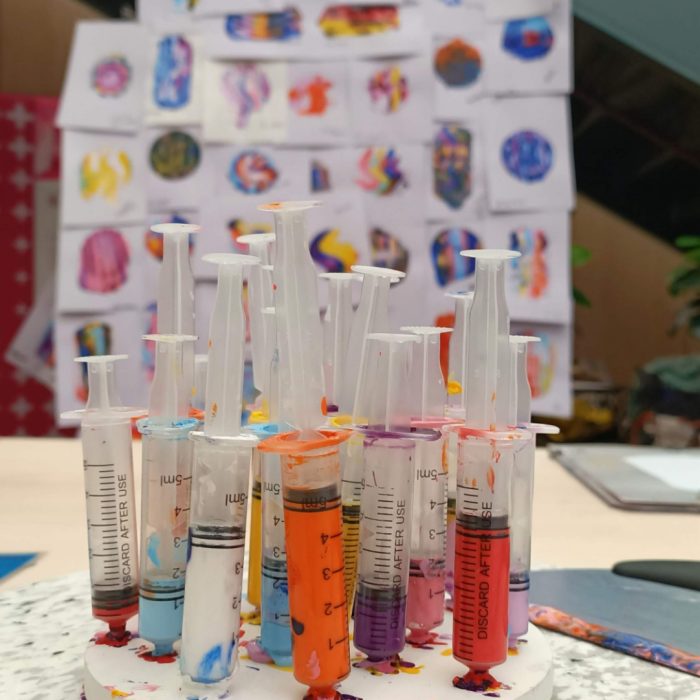Festival of Care
Fostering wellbeing in hospitals through arts-based interventions.

The problem
Hospitals are fast-paced, high-pressure environments by nature. In the wake of the COVID-19 pandemic, many healthcare workers were experiencing workplace pressure and stress.
Our approach
The Festival of Care brought creative, arts-based interventions to hospitals to help foster self-care and recognise the dedication of healthcare staff. It provided a ‘taster’ of evidence-driven experiential tools to enhance wellbeing and assist with managing anxiety, trauma and burnout.
Arts-based recovery or wellbeing therapies are often used for patient care. The festival explored ways to introduce and embed arts-based care in hospitals for staff. It was informed by more sustained work with communities conducted by the Big Anxiety Research Centre (BARC) at UNSW to transform the impacts of trauma.
The program encouraged staff to ‘pause and engage’ within their busy workdays. It included welcome events, ‘awkward conversations’ (15-minute one-to-one conversations on hard-to-tackle issues with trained listeners), artists in residence, ambient live music, virtual reality for wellbeing, interactive musical experiences, and hands-on workshops.
It aimed to start conversations and provide connections to further support through an accessible, fun, and relaxing experience.
The outcomes
In 2023 the festival was held at St George, Sutherland, Sydney and Sydney Eye Hospitals, Garrawarra Aged Care Centre and Randwick Campus (Prince of Wales Hospital, Mental Health Services and Royal Hospital for Women). The festivals offered light-touch engagements and opportunities for interaction that people could return to later for a deeper engagement.
The hospital environments were transformed through ambient interventions, including a series of sculptures which were fabricated within the Design Futures Lab using recycled plastics, including expired hospital scrubs.
Collaborative opportunities, such as ‘Make your Mark’ where staff were invited to ‘make a mark’ or an individual artwork, were also offered. These artworks were digitally combined to create a collective mural for installation within each hospital.
“We knew we wanted to do something in this space, but we really wanted academic rigour around it, and we knew ADA could meet that brief for us.”
Tobi Wilson, Former Chief Executive, SESLHD
Hospital staff also had access to Embodimap, a ten-minute experiential VR program designed by the BARC team that allows users to explore and map their feelings through their body. The program is used extensively in support contexts.
An in-depth theatre project on mental health and suicide, codesigned with junior doctors and nursing staff at the inaugural 2017 Big Anxiety Festival, also provided a framework for discussing mental health, toxic workplaces, and other related issues.
Project partners
- South Eastern Sydney Local Health District (SESLHD)
- The Big Anxiety Research Centre (BARC) at UNSW
- Design Futures Lab
Work with us
The UNSW Innovation Hub tackles diverse problem-solving projects, varying in size, complexity and subject matter. We specialise in complex challenges that require collaboration, a design-led approach, and that can’t be addressed by a single discipline.
If you have a project proposal or potential partnership that you would like to discuss, please get in touch.
- Overview
- News
- Our team
- References

